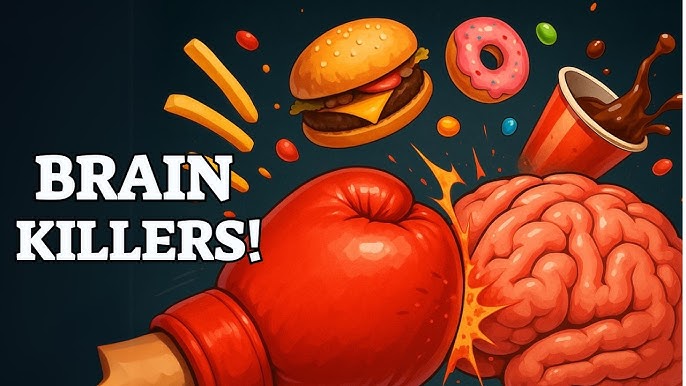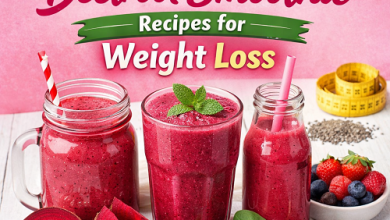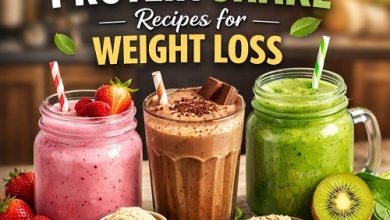6 Everyday Foods That Are Secretly Destroying Your Brain Health

When most people think about brain health, they picture crossword puzzles, meditation, or maybe taking supplements like omega-3s. What many don’t realize, however, is that the foods we eat every day can make or break our cognitive performance. Your brain consumes about 20% of your body’s daily energy, which means what you put on your plate directly affects memory, mood, focus, and even long-term risk for conditions like dementia or Alzheimer’s disease.
While some foods fuel mental clarity and protect against cognitive decline, others do the exact opposite. What’s alarming is that many of the worst offenders are everyday staples—things we eat without a second thought. These foods may give you a temporary burst of energy or satisfy cravings, but over time, they quietly damage your neurons, inflame brain tissue, and interfere with neurotransmitters.
Six everyday foods that could be secretly destroying your brain health, explain the science behind why they’re harmful, and offer healthier swaps to protect your mind for years to come.
6 Everyday Foods that Destroying Your Brain Health
1. Refined Sugars – The Sweet Poison for Your Brain
Sugar might taste delicious, but it’s one of the most harmful ingredients for your brain. From soft drinks to pastries, refined sugar lurks in almost every packaged food we consume.
Why It’s Harmful
- Blood Sugar Spikes and Crashes: The brain thrives on a steady supply of glucose, but refined sugars cause wild fluctuations in blood sugar levels. These swings lead to mood instability, brain fog, and fatigue.
- Neuroinflammation: High sugar intake triggers inflammation in the brain, particularly in the hippocampus, which plays a crucial role in learning and memory.
- Memory Impairment: Research shows that diets high in sugar reduce the production of brain-derived neurotrophic factor (BDNF), a protein essential for memory formation and learning.
- Risk of Dementia: Long-term consumption is linked to insulin resistance in the brain, sometimes called type 3 diabetes, which increases the risk of Alzheimer’s disease.
Common Sources
- Breakfast cereals
- Flavored yogurts
- Soda and energy drinks
- Candy and baked goods
- Sauces like ketchup and BBQ
Smarter Swaps
- Replace soda with sparkling water infused with lemon or berries.
- Choose plain Greek yogurt and add fresh fruit instead of sweetened varieties.
- Use raw honey or stevia sparingly instead of white sugar.
2. Processed Meats – A Toxic Cocktail of Additives
Bacon, sausages, hot dogs, deli meats—these are favorites in many households. But processed meats are among the worst foods for brain health.
Why It’s Harmful
- Nitrites and Nitrates: These preservatives give processed meats their color and shelf life but form nitrosamines in the body, which damage brain cells and impair cognitive function.
- High in Saturated Fats: Too much saturated fat contributes to arterial plaque buildup, reducing blood flow to the brain. Poor circulation means less oxygen and fewer nutrients reaching brain tissue.
- Inflammation and Oxidative Stress: Additives and preservatives in processed meats increase oxidative stress, accelerating brain aging.
- Increased Risk of Depression: Several studies link high processed meat consumption with higher rates of depression and mood disorders.
Common Sources
- Bacon
- Ham
- Salami
- Pepperoni
- Canned meats
Smarter Swaps
- Choose lean, fresh cuts of chicken, turkey, or fish.
- Explore plant-based protein options like lentils, beans, and chickpeas.
- If you love sandwiches, swap deli meats with grilled chicken or roasted veggies.
3. Fried Foods – A Fast Track to Cognitive Decline
Crispy fries, fried chicken, onion rings—fried foods are comfort food at its finest. Unfortunately, they’re also among the most damaging for your brain.
Why It’s Harmful
- Trans Fats: Many fried foods are cooked in hydrogenated oils containing trans fats, which are toxic to neurons and impair communication between brain cells.
- Memory Loss: A study from the American Heart Association found that people with diets high in fried foods scored worse on memory and cognition tests.
- Reduced Neuroplasticity: Fried foods diminish the brain’s ability to adapt, learn, and form new neural connections.
- Mood Disorders: High intake is linked to anxiety and depression due to inflammation and disruption of neurotransmitter balance.
Common Sources
- French fries
- Fried chicken
- Donuts
- Potato chips
- Tempura
Smarter Swaps
- Bake or air-fry instead of deep-frying.
- Use healthy oils like olive oil or avocado oil in moderation.
- Snack on roasted nuts or baked veggie chips instead of greasy fried snacks.
4. White Bread and Refined Carbs – Brain Fog on a Plate
White bread, pasta, pastries, and many crackers are made from refined flour, which has been stripped of fiber and nutrients.
Why It’s Harmful
- Rapid Glucose Spikes: Like sugar, refined carbs cause blood sugar levels to spike and crash, leading to sluggishness and poor concentration.
- Reduced Brain Volume: Studies show diets high in refined carbs are associated with a smaller hippocampus—the part of the brain critical for memory.
- Accelerated Cognitive Decline: High-glycemic foods are linked to increased risk of mild cognitive impairment (MCI) and dementia.
- Addictive Properties: Refined carbs stimulate dopamine in the brain, creating cravings similar to addictive substances.
Common Sources
- White bread and rolls
- Pasta made from refined flour
- Cakes, muffins, pastries
- Crackers and pretzels
- Instant noodles
Smarter Swaps
- Opt for whole-grain bread, brown rice, or quinoa.
- Experiment with almond flour or oat flour for baking.
- Choose steel-cut oats over instant oatmeal.
5. Artificial Sweeteners – The Brain’s Chemical Saboteurs
Many people reach for diet soda or sugar-free gum thinking they’re making a healthier choice. Unfortunately, artificial sweeteners may be worse for your brain than sugar.
Why It’s Harmful
- Neurotoxicity: Some artificial sweeteners, particularly aspartame, break down into chemicals that can alter brain chemistry and impair memory.
- Mood Disorders: Research links high artificial sweetener intake with higher risk of anxiety, depression, and even seizures in sensitive individuals.
- Disrupted Gut-Brain Axis: Artificial sweeteners change the gut microbiome, which indirectly harms brain function since gut bacteria produce neurotransmitters like serotonin.
- False Reward Signals: They trick the brain into thinking sugar is coming, but when it doesn’t, it increases cravings and disrupts appetite regulation.
Common Sources
- Diet sodas
- Sugar-free candy and gum
- “Low-calorie” desserts
- Flavored protein powders
- Packaged sugar substitutes
Smarter Swaps
- Sweeten drinks with small amounts of honey, maple syrup, or coconut sugar.
- Try natural low-calorie alternatives like stevia or monk fruit.
- Flavor water with cucumber, lemon, or mint instead of diet soda.
6. Alcohol – The Silent Brain Shrinker
While an occasional glass of red wine might have some heart benefits, excessive alcohol consumption is a major brain health destroyer.
Why It’s Harmful
- Brain Shrinkage: Chronic alcohol use physically shrinks brain tissue, particularly in areas linked to memory and decision-making.
- Neurotransmitter Disruption: Alcohol alters levels of dopamine, serotonin, and GABA, leading to mood swings, anxiety, and impaired judgment.
- Memory Loss: Even moderate drinking is linked to poor short-term memory and reduced learning ability.
- Increased Risk of Dementia: Long-term alcohol abuse is a leading cause of alcohol-related dementia and Wernicke-Korsakoff syndrome.
Common Sources
- Beer
- Wine
- Hard liquor (vodka, whiskey, rum, etc.)
- Cocktails with added sugar
Smarter Swaps
- Limit alcohol intake to occasional, moderate consumption.
- Replace with mocktails made from sparkling water, herbs, and fruit.
- Try adaptogenic drinks made from ingredients like ashwagandha or reishi mushrooms for relaxation without brain damage.
The Domino Effect: How These Foods Add Up
The danger of these foods isn’t just in eating them occasionally. It’s the cumulative effect of consuming them daily or in large quantities. When sugar, fried foods, processed meats, and alcohol combine in your diet, they:
- Increase chronic inflammation
- Accelerate brain aging
- Impair memory and focus
- Elevate risk for depression and anxiety
- Raise the likelihood of neurodegenerative diseases
In essence, a poor diet chips away at your brain health day by day until the damage becomes noticeable in your 40s, 50s, or beyond.
How to Protect Your Brain Instead
The good news? Just as bad foods harm the brain, good foods can heal and protect it. Here are some brain-boosting dietary strategies:
- Eat More Omega-3s: Found in salmon, walnuts, chia seeds, and flaxseeds—omega-3 fatty acids are essential for building healthy brain cells.
- Load Up on Antioxidants: Blueberries, spinach, dark chocolate, and green tea fight oxidative stress in the brain.
- Choose Whole Grains: Quinoa, oats, and brown rice provide steady energy without glucose spikes.
- Stay Hydrated: Even mild dehydration reduces cognitive performance, so drink plenty of water.
- Go Mediterranean: The Mediterranean diet, rich in olive oil, fish, veggies, and legumes, is proven to reduce cognitive decline.
Final Thoughts
Your brain is your command center—it controls your thoughts, memories, emotions, and every move you make. Protecting it should be a top priority. Unfortunately, many of the foods we eat daily—sugar, refined carbs, processed meats, fried foods, artificial sweeteners, and alcohol—are slowly chipping away at this vital organ.
The first step is awareness. By identifying and limiting these foods, you can dramatically reduce your risk of brain fog, mood disorders, memory loss, and long-term neurodegeneration. The second step is replacement: filling your diet with nutrient-rich, brain-loving foods that energize your mind and preserve your mental sharpness.
Small changes today—like swapping soda for water, white bread for whole grain, or fried snacks for roasted nuts—can make a huge difference for your brain health tomorrow.
After all, what’s the point of living longer if your brain isn’t functioning at its best? Protect it, fuel it wisely, and give it the nutrition it deserves.




